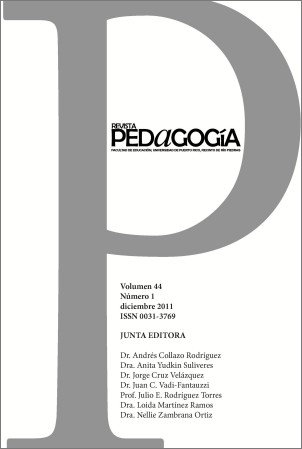Abstract
The purpose of this essay is to inquire about the phenomenon of the feminization. The concepts of inclusion and exclusion in relation to modes of representation contribute to understand and explain the levels of participation of women in social and labor scenarios. In the context of the expansion of formal education, it examines the discourses of vocation and professionalism related to the professionalization of areas with equal participation of women and professional areas known as non-traditional. The essay addresses the following questions: how do women assume the working and professional scenarios of education?, and what elements signify the discourse of feminization in professional areas such as education?
How to cite:
Martínez-Miranda, M. S. (2011). El fenómeno de la feminización: Una lectura desde el magisterio. Pedagogía, 44(1), 37-57. Retrieved from https://revistas.upr.edu/index.php/educacion/article/view/16559
References
Apple, M. (1994). Educación y poder (2da. edición). Barcelona, España: Editorial Paidós.
Apple, M. (1997). Maestros y textos: Una economía política de las relaciones de clase y de sexo en educación. Barcelona, España: Editorial Paidós.
Apple, M. (2001). Educar 'como Dios manda‘. Barcelona, España: Editorial Paidós.
Báñez Tello, T. (2005). Del trabajo del apostolado a la profesionalización: Análisis de la profesión de trabajo social. Cuadernos de Trabajo Social, 18, 79-98.
Berger, P. & Luckmann, T. (1995). La construcción social de la realidad (13ra reimpresión). Buenos Aires, Argentina: Amorrourtu editores.
Bolton, S. & Munzio, D. (2005). The paradoxical processes of feminization in the professions: The case of established, aspiring and semi-professions. Working paper, No. 48. Lancaster, UK: Lancaster University Management School. Recuperado de http://www.lums.lancs.ac.uk/publications/
Dávila Vincenty, M. (1996). Una reconstrucción histórica del magisterio puertorriqueño en las voces de sus maestros: 1900-1940. Tesis doctoral no publicada. Universidad Interamericana de Puerto Rico.
England, K. & Boyer, K. (2009). Women‘s work: The feminization and shifting meanings of clerical work. Journal of Social History, 43(2), 307-340.
Evetts, J. (2005). The management of professionalism: A contemporary paradox (trabajo inédito). Kings College, London.
Hall, S. (1996a). The meaning of New Times. En: D. Morley & K. B. Hsing
Chen (Eds.) Stuart Hall: Critical dialogues in cultural studies. London: Routledge.
Hall, S. (1996b). New ethnicities. En D. Morley & Kuan B. Hsing Chen (Eds.), Stuart Hall: Critical dialogues in cultural studies. London: Routledge.
Leathwood, C. (2005, October). "Treat me as a human being—don‘t look at me as a woman": Femininities and professional identities in further education. Gender and Education, 17( 4), 387–409.
Lincoln, A. (2010, julio). The shifting supply of men and women to occupations: Feminization in Veterinary education. Social Forces, 88(5).
Lobato, M. & Feliciano, N. (2006) Mujeres trabajando. Proyecto auspiciado por el Centro de Estudios de Género, Facultad de Estudios Generales. Recuperado de http://tendenciaspr.com/Publicaciones/Mujeres/Informe_final_mujeres.pdf
Lowther, M. & McMillan, (W. 2006). Securing the future: from professionalism to professionalization. Recuperado de http://www.ica2006.com/Papiers/333/333.pdf
Martínez Miranda, M. S. (2003). La feminización del magisterio. En L. Martínez Ramos & M. Tamargo, Género, sociedad y cultura. Colombia: Publicaciones Gaviota.
Martínez Ramos, L. & Alvarado, A. D. (2007). Proyecto de participación y representación por género en Educación Superior. San Juan, PR: Consejo de Educación Superior de Puerto Rico.
Nicolescu, B. (2002). Manifesto of Transdisciplinarity. Albany, NY: State University of New York Press.
Osuna, J. J. (1949). A history of education in Puerto Rico. Río Piedras, PR: Editorial de la Universidad de Puerto Rico.
Popkewitz, T. & Lindbald, S. (2000). Educational governance and social inclusion and exclusion. Discourse: Studies in the cultural politics of education, 21(1), 5-44.
Scott, J. W. (1986) Gender: A useful category of historical analysis. American Historical Review, 91, 1053-1075.
Yannoulas, S. (1992). Acerca de cómo las mujeres llegaron a ser maestras (América Latina 1870-1930). Revista Brasileña de Estudios Pedagógicos, 73(175), 497-521.
The contents published in the Puerto Rico Journal of Education is freely distributed under open access practices, in accordance with the Creative Commons license, Attribution-NonCommercial 4.0 International (CC BY-NC 4.0). Through these principles, the journal and its authors allow readers to access, reproduce and share articles in full text. Users should give credit to authors in a reasonable way without suggesting they have their support. Under no circumstances, readers may make use of the contents for commercial purposes. The authors retain copyright on their works.

